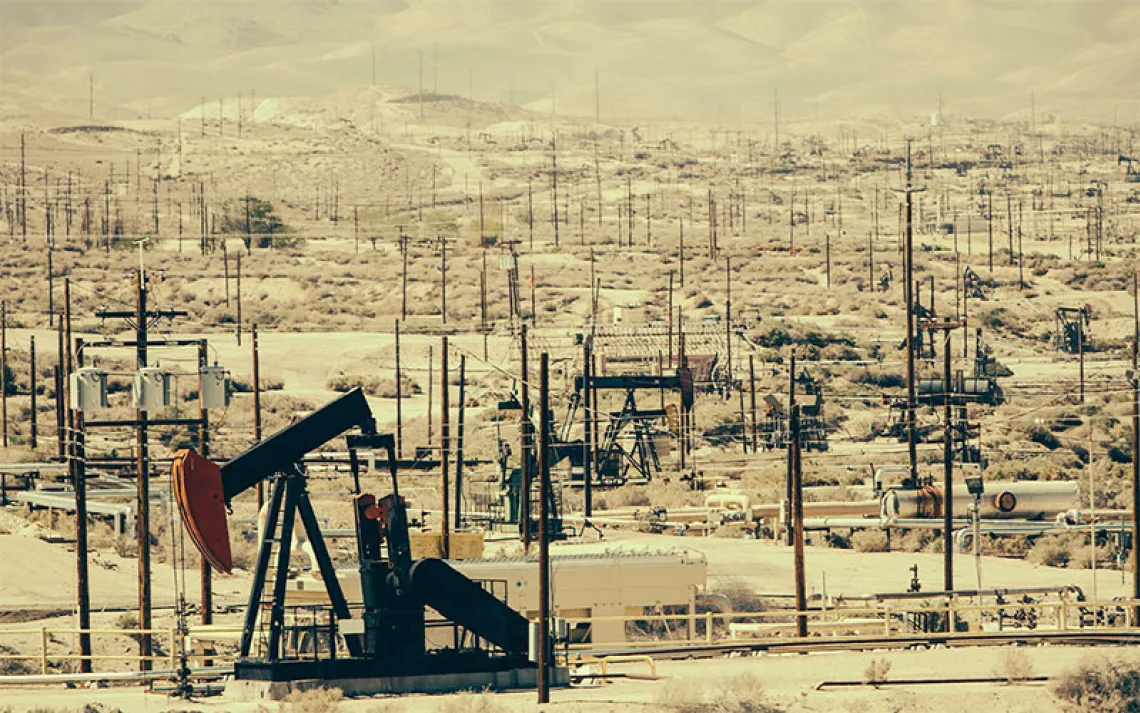Canada Pushes Keystone XL Before Biden Takes Office
But canceling the Canadian oil pipeline might be one of Biden’s first acts

The proposed route of the Keystone XL oil pipeline where it crosses into the United States from Canada in Phillips County, Montana. | Photo by Al Nash/Bureau of Land Management via AP
Though little love has been lost between the Justin Trudeau and Donald Trump administrations on most issues, they are united behind one of the most contested fossil fuel infrastructure pipelines in North America: the Keystone XL pipeline.
Now, Canada is in a race against time to construct as much of the pipeline as possible before the administration of President-Elect Joe Biden takes power, even as First Nations and environmental advocates press Biden to shut down the on-again, off-again project—which would ferry as much as 850,000 barrels of oil sands crude piped from Canada to refineries in Illinois and Texas—once and for all.
Although the first three phases of the Keystone pipeline system have been constructed, the prized Keystone XL pipeline, which would run from Hardisty, Alberta, across the border into the United States, is not. Currently, the project is under construction in places along the route thanks to an executive order issued by President Trump in 2017. Prior to that move, the project was rejected by the Obama administration.
In the lead-up to the November 3 election, Biden pledged to rescind the permit and stop the project. “Biden strongly opposed the Keystone pipeline in the last administration and will proudly stand in the Roosevelt Room again as president and stop it for good by rescinding the Keystone XL pipeline permit,” the campaign said in a statement last May.
“To be blunt, it means that Keystone is dead,” says Tzeporah Berman of Stand Earth. “Biden has committed to stopping Keystone, and his comments in the last debate recognizing the need to transition away from oil reinforce that promise.”
If the project is doomed, Canadian prime minister Justin Trudeau is not acting like it. All indications are that his government will continue to pursue the construction of Keystone XL. On November 8, Canada’s foreign affairs minister François-Philippe Champagne wasted little time in asserting that the federal government will do all it can to urge Biden to give the pipeline a pass.
“We’re going to be making our case, saying that Canada is the most reliable energy supplier to the United States,” he said during an appearance on a CBC-TV news program following the American election.
These overtures, seemingly made before any other issue shared between the two nations was discussed with the incoming Biden administration, came as a shock to many, including Kai Nagata of the Dogwood Initiative.
“The Canadian government is going to make it as difficult as they can [to kill the project] because they've indicated that the number one priority of their interaction with the new administration is Keystone XL,” he explains. “You would think that in the middle of a pandemic, where we have the longest unprotected border in the world closed to travel and commerce, there might be other priorities.”
Berman suggests Canada's support for Keystone is based on an increasingly weak political calculus that supporting new oil pipelines is critical to achieving national unity around an energy and climate strategy.
“It is the result of over a decade of oil company public relations and fear-mongering that our economy will collapse without expansion of the oil industry,” Berman explains. “The bottom line is that it is both a failure of imagination and a lack of courage to lead us into a climate-safe and renewable energy future that forces politicians to continue to support new pipelines while simultaneously declaring a climate emergency.”
And it isn’t just the federal government advocating for the construction of the mega-project that would lock in oil sands expansion for years to come. The province of Alberta, which owns part of the pipeline along with Canadian infrastructure company TC Energy, has made an attempt to construct as much of KXL as possible on its side of the border to make it harder to stop.
Alberta premier Jason Kenney’s prepared statement congratulating President-Elect Biden on the election results stressed the importance of Alberta oil to American energy security in the third paragraph and mentioned no other issue. It’s no surprise. Kenney has leveraged an immense amount of political and monetary capital in the project, including an investment of $1.5 billion and a $6 billion loan guarantee.
“US energy security is dependent on Alberta as the United States' largest source of oil imports,” Kenney stated. Much of the American economy is fueled by Alberta energy. We look forward to working with President-Elect Biden’s transition team and future administration to ensure that this vital economic partnership continues.”
The sunk cost strategy that Alberta is employing is an attempt to make it as difficult as possible, financially and politically, to quash the Keystone XL project.
“The Alberta government wants to see as much of it built as possible before Biden has to make a decision in order to be able to basically whine about those costs,” said Nagata.
There is also the specter of another NAFTA challenge looming in the background, which TC Energy had launched following President Obama’s cancellation of the project. The $15 billion suit was suspended in 2017 on word that President Trump would move KXL forward.
According to Catherine Abreu, executive director of the Climate Action Network Canada, continuing to advocate for KXL might be the Trudeau government’s way of appeasing Alberta—which is a province where Trudeau’s liberals have no seats and little hope of getting any in a potential spring election—and Bay Street (Canada’s financial center).
“It reads as an alarmingly unstrategic diplomatic move to make it one of their first orders of business with a new Biden administration, given how clear the Biden campaign has made their position on climate and these kinds of projects,” Abreu says.
Oil demand remains soft, and prices continue to track lower. Nagata describes the scene in the oil sands as a “bloodbath” as investors continue to pull out and cancel expansion projects. Last spring, when word dropped that Biden would cancel KXL if elected, TC Energy share prices dropped by almost 2 percent the next day.
“While it may seem politically smart in the short term,” says Berman, of Canada’s continued support of oil sands expansion projects, “it only makes the inevitable transition to a low carbon economy harder and more expensive for Canada.”
The fact that the Canadian government has already come out again in support of KXL and has confirmed its willingness to advocate for it with the United States was enough to provide a glimmer of hope to Tim McMillan, chief executive of the lobby group Canadian Association of Petroleum Producers.
“The first opportunity and one of the most important will be the early phone calls between the Canadian government and the president-elect and his team,” he recently said.
If the Democratic Party does not take control of the Senate, the Biden administration may have no choice but to negotiate with Republicans that oppose killing Keystone XL. But, according to Anthony Swift of the Natural Resources Defense Council, GOP support for the project will not be enough leverage to get KXL to the finish line.
“The opposition to Keystone XL is broad, and the case against the project is central to Biden’s climate vision—he wants a rapid transition away from fossil fuels to clean energy, to increase both the US and Canada’s climate ambition beyond Paris 2030 commitments, and eliminate global fossil fuel subsidies,” Swift says. “Canada isn’t on a trajectory to meet its Paris goals (let alone more ambitious goals) because of its growing tar sands industry. It’s hard to imagine that Biden would approve a pipeline heavily subsidized by the province of Alberta that would support further tar sands growth for decades to come, undermining his domestic and international climate goals.”
If the Biden administration does cancel Keystone XL, it could potentially help Canada fast-track its own climate commitments, which are a major plank of the Trudeau administration despite its heavy investment in the oil and gas industry.
“Biden is taking a scientific approach to emissions and production,” Berman says. “If we are phasing out fossil fuels, we simply don't need more fossil fuel infrastructure. We urgently need to be putting all our intellectual, political, and financial capital towards renewable energy and electrification infrastructure.”
 The Magazine of The Sierra Club
The Magazine of The Sierra Club



